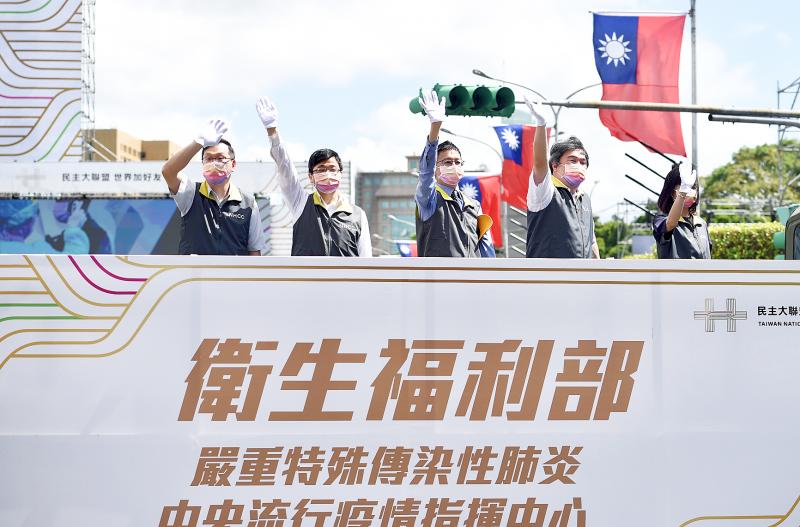The Central Epidemic Command Center (CECC) yesterday reported seven imported COVID-19 cases, but no locally transmitted infections or deaths.
The cases were Taiwanese, Burmese and Indonesian nationals, who arrived from Myanmar, Indonesia, Malaysia and Singapore between Sept. 27 and Friday, the CECC said in a news release.
It did not hold its daily news conference due to Double Ten National Day celebrations.

Photo: Peter Lo, Taipei Times
Meanwhile, there have been discussions about whether contact tracing should be conducted for cases with low viral loads and high levels of antibodies, which indicate that the infected person did not contract the disease recently.
Experts say that these cases are unlikely to be contagious.
The discussions emerged after the center on Saturday reported the first local COVID-19 case this month — a one-year-old girl who had COVID-19 antibodies and a cycle threshold value of 38, indicating that the child was not infected recently.
However, Linkou Chang Gung Memorial Hospital deputy superintendent Chiu Cheng-hsun (邱政洵) said that contract tracing should be conducted for such cases.
While there have been fewer domestic cases, regular testing is important to closely monitor the COVID-19 situation in communities, especially as the center gradually eases disease prevention rules, said Chiu, who also works as a physician in the hospital’s pediatric infection division.
The hospital tests about 600 to 700 people for COVID-19 every day, and occasionally as many as 1,000 people, Chiu said, adding that cases such as the infant’s are sometimes detected.
Contact tracing would also help confirm that the cases have not recently had contact with an infected person, he added.
Cases with low viral loads and high antibody levels pose a very low risk of spreading the virus, but people with compromised immune systems might still be at risk if they are in close contact with such a case, Chiu said.
Separately, Kaohsiung Municipal United Hospital on Saturday said that its deputy superintendent had been reprimanded after COVID-19 vaccines were given to 42 ineligible people who work for Taiwan High Speed Rail Corp (THSRC).
The superintendent has also asked the hospital to punish his deputy for failing to fulfill his supervisory responsibilities, it said, adding that the request would have to be approved by the Kaohsiung Department of Health.
Local media reported that the 42 THSRC employees on Sept. 22 asked to get inoculated with Moderna COVID-19 vaccines, claiming that they were in priority group 3 — frontline workers with a high contact risk — even though they were in group 7.
After hospital staff initially refused to vaccinate them, there was a dispute.
To end the standoff, the deputy superintendent reportedly ordered staff to vaccinate the 42.
THSRC on Oct. 1 said in a statement that employees who make false statements to get vaccinated would be punished.
Additional reporting by CNA

A decision to describe a Chinese Ministry of Foreign Affairs statement on Singapore’s Taiwan policy as “erroneous” was made because the city-state has its own “one China policy” and has not followed Beijing’s “one China principle,” Deputy Minister of Foreign Affairs Tien Chung-kwang (田中光) said yesterday. It has been a longstanding practice for the People’s Republic of China (PRC) to speak on other countries’ behalf concerning Taiwan, Tien said. The latest example was a statement issued by the PRC after a meeting between Singaporean Prime Minister Lawrence Wong (黃循財) and Chinese President Xi Jinping (習近平) on the sidelines of the APEC summit

Taiwan’s passport ranked 34th in the world, with access to 141 visa-free destinations, according to the latest update to the Henley Passport Index released today. The index put together by Henley & Partners ranks 199 passports globally based on the number of destinations holders can access without a visa out of 227, and is updated monthly. The 141 visa-free destinations for Taiwanese passport holders are a slight decrease from last year, when holders had access to 145 destinations. Botswana and Columbia are among the countries that have recently ended visa-free status for Taiwanese after “bowing to pressure from the Chinese government,” the Ministry

‘SIGN OF DANGER’: Beijing has never directly named Taiwanese leaders before, so China is saying that its actions are aimed at the DPP, a foundation official said National Security Bureau (NSB) Director-General Tsai Ming-yen (蔡明彥) yesterday accused Beijing of spreading propaganda, saying that Chinese President Xi Jinping (習近平) had singled out President William Lai (賴清德) in his meeting with US President Joe Biden when talking about those whose “true nature” seek Taiwanese independence. The Biden-Xi meeting took place on the sidelines of the APEC summit in Peru on Saturday. “If the US cares about maintaining peace across the Taiwan Strait, it is crucial that it sees clearly the true nature of Lai and the ruling Democratic Progressive Party (DPP) in seeking Taiwanese independence, handles the Taiwan question with extra

HEALTHCARE: Following a 2022 Constitutional Court ruling, Taiwanese traveling overseas for six months would no longer be able to suspend their insurance Measures allowing people to suspend National Health Insurance (NHI) services if they plan to leave the country for six months would be abolished starting Dec. 23, NHIA Director-General Shih Chung-liang (石崇良) said yesterday. The decision followed the Constitutional Court’s ruling in 2022 that the regulation was unconstitutional and that it would invalidate the regulation automatically unless the NHIA amended it to conform with the Constitution. The agency would amend the regulations to remove the articles and sections that allow the suspension of NHI services, and also introduce provisional clauses for those who suspended their NHI services before Dec. 23, Shih said. According to